Picky Eating Prevention Tips with Stephanie Cohen, MA, CCC-SLP, CLC
In this episode we're talking about:
- WHY oral-sensory exploration is the foundation of learning how to eat…it's not our job to MAKE the baby eat!
- WHAT “picky eating” means to Stephanie as a mom, SLP and feeding therapist…but also why she doesn't love the term
- HOW “getting your baby to love vegetables” is not something we should be celebrating as a parenting win or badge of honor
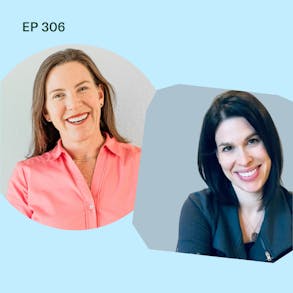
LISTEN TO THIS EPISODE
Episode Description
Does the term “picky eating” make your skin crawl? My guest Stephanie Cohen, MS, CCC-SLP, CLC isn’t a fan of it either - but picky eating IS something parents ask about and as a feeding therapist, she has thoughts. In this episode Stephanie is sharing some easy ways we can foster independence at mealtimes even from our babies’ first bites.
About the Guest
- Stephanie Cohen, MA, CCC-SLP, CLC is a speech language pathologist, feeding therapist and lactation counselor

- Stephanie works in private practice in the Chicago area and also with Marsha Dunn Klein’s Get Permission Institute
- She is passionate about helping children 0-3 with feeding challenges and is an Early Intervention evaluator

Links from this Episode
- Follow Stephanie on Instagram @learntotalkwithme and TikTok @learntotalkwithme
- The article that Stephanie mentioned she co-wrote for an ASHA publication about pediatric feeding disorder can be accessed here: https://pubs.asha.org/doi/10.1044/2022_PERSP-20-00259
- Baby-Led Weaning with Katie Ferraro program with the 100 First Foods™ Daily Meal Plan, join here: https://babyledweaning.co/program
- Baby-Led Weaning for Beginners free online workshop with 100 First Foods™ list to all attendees, register here: https://babyledweaning.co/baby-led-weaning-for-beginners
Other Episode Related to This Topic:
- Episode 36 - Preventing Picky Eating from Baby's First Bites with Katja Rowell, MD
- Marsha Dunn Klein episodes
- Episode 145 - Stay in Your Lane: Parent & Baby Roles in Infant Feeding with Marsha Dunn Klein OTR/L, MEd, FAOTA
- Episode 170 - Sensory 101: What Motivates Babies to Eat? with Marsha Dunn Klein, OTR/L, MEd
- Episode 236 - Positive Tilt: Get Permission from Your Baby with Marsha Dunn Klein, OTR/L, MEd, FAOTA
- Episode 290 - Pre-Feeding Skills: What Can My Baby Do Before Beginning Solid Foods? with Marsha Dunn Klein OTR/L, MEd, FAOTA

Latest Episodes

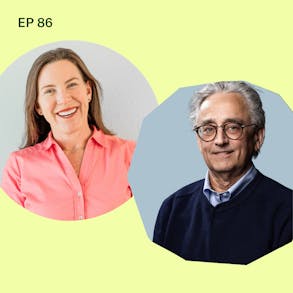

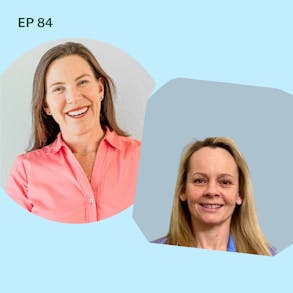
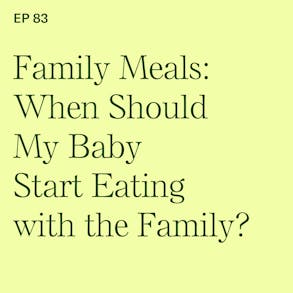
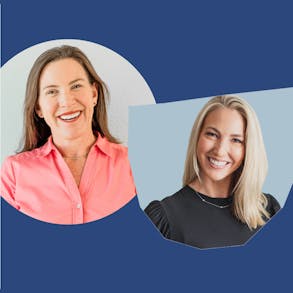
Stephanie Cohen (31s):
Our goal is that babies and toddlers are able to try new foods when given appropriate opportunities, when they want to and when they're ready. When I am working with families and getting to know them, I think about what are those things that get in the way? Is this child able to try something? Are their mouth muscles able to manage this new food? If they want to taste it, is their body supporting their desire to taste something or is something not working? So I think that as we get to know families as individuals, we can really start to peel back the layers and understand how is this child able or not able to participate in mealtime routines with their family?
Katie Ferraro (1m 12s):
Hey there. I'm Katie Ferraro, registered dietitian, college nutrition professor and mom of seven specializing in baby-led weaning. Here on the Baby-led Weaning Made Easy podcast, I help you strip out all of the noise and nonsense about feeding, leaving you with the confidence and knowledge you need to give your baby a safe start to solid foods using baby-led weaning. To be clear, both my guests today and myself, loathe the term picky eating. Picky eating, ugh. It's a subjective term loaded with a lot of emotion and whenever possible I try to avoid the term picky eater because as applied to a child, it's identifying the child by a food related behavior, which is not fair.
Katie Ferraro (1m 57s):
And it's kinda like how in diabetes management, as a diabetes and diabetes educator, we don't refer to anyone as a diabetic, right? People that have cancer are not called cancer addicts. The condition does not define the person. We say a person with diabetes, PWD, and have for a long time now, like literally to the point that occasionally you'll hear someone talking about diabetics, it's just like nails on the chalkboard. So even the title of this episode, Picky Eating Prevention Tips, kind of makes my skin crawl. Same with my guest Stephanie Cohen. Stephanie is a speech language pathologist and feeding therapist. She specializes in pediatric speech and feeding and is a lactation counselor. Stephanie's a mom of three and she's based in the Chicagoland area. She's also the co-founder of the Get Permission Institute with the very esteemed Marsha Dunn Klein.
Katie Ferraro (2m 42s):
Marsha, who wrote the book on pre-feeding skills, a goddess in the world of infant feeding, is she's been on the podcast a number of times in the past and she introduced me to Stephanie. And so I had a wonderful conversation with Stephanie. We both agree that while we don't love the term picky eating, it is a thing that's out there there. It's a thing that parents ask about. And I always like to remind parents, listeners, other healthcare professionals, that picky eating is a natural part of becoming a toddler, right? You are not a bad parent if your child exhibits selective eating behavior. If you're concerned about your child's picky eating, like wow, is this more than typical toddler or child picky eating? I highly suggest that you listen to episode 36, Preventing Picky Eating from Babies' First Bites with Katja Rowell.
Katie Ferraro (3m 25s):
She's a physician, she does a wonderful job explaining what extreme picky eating is. She's also the author of the book, Extreme Picky Eating or How to Help Your Child With Extreme Picky Eating, but before we get into the interview with Stephanie, I wanna note also that there's really no surefire way to prevent picky eating. Okay? Nearly all children will exhibit behaviors that could be called picky eating at some point in their development. Picky eating as we kind of understand it and speak about it is developmentally appropriate. Okay? Doing baby-led weaning is not going to hands down prevent picky eating, okay? There is some data to support the idea that helping babies achieve diet diversity helps to limit the severity of picky eating. So basically you can mitigate it. It's kind of the whole crux behind my original hundred first foods program is that by helping your baby safely learn how to eat a hundred different safe baby-led weaning foods before they turn one, you are taking advantage of that crucial flavor window that opens up in the second half of infancy, right?
Katie Ferraro (4m 16s):
You're helping to reduce the severity of picky eating that we typically would see with traditionally spoon-fed babies who might only have 10 or 12 foods under their belt by the time they turn one. So in this interview, Stephanie's gonna share some really down to earth recommendations about how to help your infants succeed in the transition to solid foods. So with no further ado, here is Stephanie Cohen who's graciously sharing her insights on some picky eating prevention tips.
Stephanie Cohen (4m 43s):
Hi Katie. I'm so excited to be here. We have so much to talk about.
Katie Ferraro (4m 47s):
Okay. I've been waiting forever to interview you. I wanna learn more about the feeding work you do. But before we get started, could you share just a little bit about your background and what you specialize in?
Stephanie Cohen (4m 54s):
Yes. So I'm a speech language pathologist and a lactation, certified lactation counselor and a mom of three. So I've got a lot going on. I have been in the field about 22 years and I've worked in a variety of different settings. So out of grad school I worked in a multidisciplinary clinic, which was an amazing experience. I got to learn from so many other disciplines and that really formed the foundation of just my knowledge base. After that, I transitioned to a small rehabilitation hospital on the south side of Chicago, which was another wonderful experience. Lots of teaming and collaboration there too, which we know is like key to success in helping to support feeding. And then once I had kids, it was the right decision for me to transition into private practice and into early intervention, which I didn't realize would become my true love, supporting families in their natural environment.
Stephanie Cohen (5m 44s):
So that's what I do now. I do a lot of teaching. I am a co-founder of the Chicago Feeding Group, which is a 501 (c)(3) nonprofit organization and we started that organization because we saw a need to support families in a more comprehensive way in Chicagoland, but also to provide professionals with low cost but high quality educational opportunities and we also love bringing students into those learning opportunities. So we do a lot over there. Most recently in the last couple of years, I teamed up with Marsha Dunn Klein and Karen Dilfer to launch the Get Permission Institute where we offer online educational opportunities focused around Marsha's get permission approach.
Stephanie Cohen (6m 27s):
We celebrate her immense contribution to our fields and want everyone to know about it and then the thing that I love about that organization is we bring in and celebrate the perspectives of so many other professionals because we really want it to be a community. And that's just been such a rewarding project. And then the last thing that I'll share is I recently have published two board books. My First Learn-to-Talk Book and My First Learn-to-Talk Book: Things That Go, so also supporting families on the speech side, which has been really fun.
Katie Ferraro (6m 58s):
Time out, you're also kind of a TikTok star. Don't forget about that.
Stephanie Cohen (7m 2s):
I accidentally established a following on TikTok, a community of parents and professionals. And it's just, it's such a rewarding thing to do. You wouldn't think that, you think TikTok social media bad, but it's become a place where I think parents who are hungry for information can learn and share experiences with other parents. So a lot of good has come out of that. It's one of my favorite things that I do.
Katie Ferraro (7m 28s):
I love that and I totally agree with you that it's like especially for us on baby-led weaning, if parents are on TikTok learning about it, I want them to be learning about it from a credentialed feeding professional. So I have to be there even though it's like sometimes the cringiest thing ever. But we've had Marsha Dunn Klein on the podcast a number of times and we've had these conversations about how important it is to have this multidisciplinary approach and too often, like we're coming out of our own individual professional trainings. Me as a dietitian, you as an SLP, Marsha as an OT, although she's certainly been in the field for many decades, but there's kinda this siloed approach and I love her whole Get Permission institute, which is really integrating all of the strengths that we have from our different professions in order to help families achieve. So thank you for the background. I think as a speech language pathologist, a lot of our parents and caregivers, they might know about speech language pathology as a profession or have heard of the SLP credential and they think speech, but you also help babies learn to eat as well as to talk.
Katie Ferraro (8m 16s):
So how are the areas of feeding and speech linked in particular for babies in your opinion?
Stephanie Cohen (8m 21s):
They overlap in a lot of really important ways and if your audience is interested in learning more about this, Suzanne Evans Morris has a wonderful article on her New Visions website talking about this. You know, when we think about how babies learn to move their muscles of their mouth in different ways, they do so through oral sensory exploration, right? And I think that a lot of the new movement patterns and sensory experiences that they have also get them ready to eat. And so although there is some controversy around, you know, if the muscles for speech aren't doing what we expect them to do, or if a child is having difficulty eating, will they absolutely have a problem in the other area of functioning?
Stephanie Cohen (9m 5s):
I think that, you know, in a lot of ways we see how they're related, but we also know that there are many children who are able to learn to talk that aren't able to eat by mouth or that are able to eat by mouth but have difficulty with, with the clarity of speech. But I think that the, the thing that we know is those oral sensory experiences that babies have early on once they start mouthing and as they grow, help develop a lot of the motor patterns that they use for both tasks.
Katie Ferraro (9m 32s):
So I know that you work with Marsha Dunn Klein, you are co-founder of the Get Permission Institute and Marsha's been here a lot to teach our audience about topics like sensory issues and her positive tilt messaging and most recently she was teaching us about pre-feeding skills as someone who like literally wrote the book on pre-feeding skills, what sort of educational initiatives in the infant feeding space do you work on with Marsha together? Like how do your skillsets combine, not overlap, but like enhance each other to help parents of, of young babies who are just making that transition to solid foods?
Stephanie Cohen (10m 2s):
Oh my gosh, where to start. It has been the honor of a lifetime to be able to learn from Marsha and work with Marsha. I sort of have to pinch myself every day and you know, I first took a get permission approach course years ago and it just really resonated with how I felt about working with children and families. And I think that at Get Permission Institute, one of our goals is to really get the information out about responsive feeding. And you know, Marsha's an occupational therapist, I'm a speech language pathologist. We are very aware of the different lenses through which we understand parents and families, but we're very like-minded in our hearts. And so I think that there are a lot of things about us that, that are very similar that make it sort of an ideal collaboration.
Stephanie Cohen (10m 47s):
And then Karen Dilfer also is the third member of the Get Permission founding team. I think that our goal at Get Permission Institute is just to continue to bring in a variety of perspectives and help professionals learn how we can all collaborate most effectively and how we can support each other and most importantly, how we can learn how to support children and families as individuals. And I'm constantly learning from Marsha about how to present opportunities. That's one of my most favorite things that I've learned from her is really thinking about mealtimes and food related activities and routines does opportunities to discover.
Stephanie Cohen (11m 28s):
So I would say that the initiatives we have are really just around building a library of high quality offerings from our colleagues in the field who we celebrate every day. And then to be able to also learn from our audience. So one of the things that we love about GPI is the interaction. You know, that's, that's really been something that we've missed from the beginning of the pandemic. We have a lot of opportunities to learn from our audience through mentoring. So I, you know, I of course am always learning and love the opportunity to learn from Marsha and Karen in that way.
Katie Ferraro (12m 3s):
Hey, we're gonna take a quick break, but I'll be right back.
Katie Ferraro (13m 13s):
And you guys have done such a great job of taking a lot of your trainings online. I know like historically Marsha's like traveled the world to give some of these talks and I love that she's still back out traveling. But I think it's really great that you're making these opportunities available, especially to other feeding professionals and credentialed feeding experts. Like we really do need to have the most up-to-date kind of current information and evidence-based practices about feeding that. To be honest, I know I'm a college nutrition professor and a lot of the stuff that they're still teaching about infant feeding is incredibly outdated both in medical school for other primary care practitioners to register dietitians. So there's certainly a lot of work out there. And let's kinda switch gears. Talk about picky eating for a minute. Super heartfelt topic in the world of baby-led weaning. Cause to be honest, a lot of parents in our audience, they stumble upon this idea of baby-led weaning with their second baby or subsequent children because they're very likely struggling with an older child who is a picky eater and they're looking up ways to help reduce the severity of picky eating or prevented in their next baby.
Katie Ferraro (14m 4s):
And think oh my gosh, this baby-led weaning thing. So I know picky eating in many regards. We kinda had this chat prior to recording, it's like a subjective term. I'm just curious about in your feeding practice, what do you define as picky eating and do you think it extends into infancy or is it something that really affects more the toddler post 12 month phase?
Stephanie Cohen (14m 22s):
This is such a tricky question and as you said, we were talking about this before we hopped on about neither of us are particularly fond of this word, but the the term is out there and it really, as I was thinking about my response to this question, I was thinking about the fact that I don't really use this term very often. It's really a term that lots of parents use and I think they that if you asked 10 different parents what a picky eater is, you'd get 10 different answers. And the same would go for a group of of professionals. So I like to kind of zoom out, as Marsha often says, I like to zoom out and think about, you know, what do we expect? What are our expectations? What do we know about feeding development in infancy and in toddlerhood?
Stephanie Cohen (15m 4s):
What are the stages that many toddlers go through? What are the stages of learning that infants go through and what are we calling picky? Are we calling picky a toddler who decides, oh you know, last week my favorite food was blueberries and this week I'm not so fond of it. And I think sometimes in the community we kind of jump to using that word or maybe another word that's similar. And as I have conversations with parents, I really try to steer clear of it and instead focus on the individual and steer parents back to this idea of, well let's look at your individual child, let's think about what do they enjoy, what are the things they enjoy more, what are the things they don't quite enjoy as much?
Stephanie Cohen (15m 44s):
And what are our expectations in terms of how preferences change over time as children learn? And I think a lot of times as preferences may narrow throughout different stages of infancy and toddlerhood, we worry that those changes could be long lasting rather than just kind of staying in the moment and thinking, hmm, why is this happening? Why is my child changing their preference? Are they truly changing their preferences or is this just the variability that we expect? So I can't really give you a specific definition.
Katie Ferraro (16m 16s):
I love that. I mean I was kind of hoping you would say that because anyone who comes at me with like a very defined definition of picky eating, I'm like, oh really? Because as you said, you could ask 10 parents, 10 professionals, it means something different. I personally never use the term just because we can't really define it and it, it's such an emotionally charged term and I think a lot of parents feel a lot of guilt. And then of course we never want to identify our children by their eating behaviors. So I like your approach of really looking at the individual and I think when you have a community of other parents, you're like, oh, that's not what my baby's doing. It can sometimes be like compare and despair like oh my gosh, her baby's 10 months of age and still likes blueberries and mine hate blueberries, but like the more you learn, you realize this is just my baby being a baby.
Katie Ferraro (16m 57s):
And some days they're gonna eat foods they ate yesterday and some days they're not. And that's totally normal, it's not my fault. Move on, keep trying different exposures. Now I'm gonna ask next about the difference between like typical peaky eating and then how that differs from severe picky eating because we don't want parents or caregivers to feel like they've caused their child to have what they may define as picky eating, especially cause we know most toddlers are going to exhibit some degree or form of food neophobia or they're not going to like the foods that they used to like. So what do you define or how do you help families if they're like, hey, is this run of the mill typical picky eating stuff or is this severe picky eating?
Stephanie Cohen (17m 30s):
That's a great question and I think that, you know, we need to help parents understand is this what we expect for your child's age and stage, or is this something that we really need to think about more carefully and dig a little bit more deeply into? And I think that from a get permission framework and just a responsive feeding framework, our goal is that babies and toddlers are able to try new foods when given appropriate opportunities, when they want to and when they're ready. And so when I am working with families and getting to know them, I think about what are those things that get in the way? Is this child able to try something? Are their mouth muscles able to manage this new food If they wanna taste it?
Stephanie Cohen (18m 15s):
Is their body supporting their desire to taste something or is something not working? So I think that as we get to know families as individuals, we can really start to peel back the layers and understand how is this child able or not able to participate in mealtime routines with their family? So in my mind it's less about necessarily a measure of severity, but really more about is this child's ability to enjoy, explore, and learn about food interfering with their ability to participate in mealtime routines with their family.
Katie Ferraro (18m 53s):
So Stephanie, parents, you know this, they feel a lot of pressure to like get their baby to eat or quote, "make sure they're getting enough." We hear this all the time as a dietitian, I know I do a lot of education on the importance of giving babies time and space to learn how to eat instead of focusing on how much the baby is eating. And especially as a dietitian type A mom like I am just as guilty of this as many of my other colleagues are. In particular with dietitians, the focus is so much, had a q and a yesterday on Instagram and a mom who I know as a dietitian was like, when do we start counting calories? I was like, are you freaking kidding me? Like that is not the point of helping your baby learn how to eat. Like what are some other examples? That's my example from the nutrition side. Calorie counting is a pressure tactic, but what are some examples of pressure tactics at mealtimes that you recommend we avoid through your lens, I guess?
Stephanie Cohen (19m 38s):
Gosh, Katie, parents are given so much information about this, about what the ideal diet looks like, about what their child should be doing at mealtimes, about which foods they should love. And it's sort of a badge of honor I think in many ways when your child learns to eat vegetables and they just love it right away. And I think it's our job, and I know you do a lot of this work too, to help parents understand that there is no ideal. There's just your child discovering what your child loves, helping your child learn, build skills, build confidence, build skills, build their confidence, and be able to eat when they're ready and when they want to, which I said before, but some examples of pressure, pressure can look a lot of different ways.
Stephanie Cohen (20m 21s):
Pressure can be subtle and pressure can be overt. So pressure can be, oh, take a bite to your broccoli. You can't have dessert unless you eat three more pieces of broccoli. Pressure can be subtle, like I'm eating my broccoli and I'm selling it. Mm, this is so good. Kids know when we're trying to get them to do something. And I love how you said it's not, it's not our job to get kids to eat. That's not the goal. It's our job to offer opportunities and support them to be able to participate. So this idea of pressure, I think that we can ask ourselves a very simple question is what you're doing an effort to try to get your child to eat something more or less or differently?
Stephanie Cohen (21m 2s):
If it is, then it could be pressure and it's a moment, an opportunity for self-reflection. I want to say though, you know, you told your story. I wanna say I'm a mom of three. I've been doing this work for a long time and I have been known to tell my children to eat their vegetables and I have been known to push my children to try something. So none of us are perfect. We are, we are parents, we are human. But I think if overall we approach mealtime experiences with the goal of enabling and supporting rather than trying to get our kids to do things this way or that way or differently, then that can be sort of our guiding philosophy that can support us in being able to really eliminate pressure as much as possible with mealtime.
Stephanie Cohen (21m 46s):
Parents oftentimes feel a lot of pressure themselves and parents try to encourage their children to eat more or differently because they're worried and because they want to support their children's health. And I think as professionals we can honor that and recognize that and help parents really understand again, what are reasonable expectations, what do we know about how children learn to eat and how they get to know foods over time. I find, and I'm sure you find that in my own personal life and in my professional life, that when parents understand what to expect, they are better able to be more patient with their children over time.
Stephanie Cohen (22m 26s):
And the one thing that I, I really like to tell parents over and over again is if your child doesn't try this food today, you have so many more opportunities to offer it. So I think if we help parents not see enjoyment of broccoli, for example, as a failure, but just as part of the learning process, we go a long way in helping them not feel like they need to use some of those more adult directed strategies to get their child to eat.
Katie Ferraro (22m 53s):
Hey, we're gonna take a quick break, but I'll be right back.
Katie Ferraro (24m 3s):
And I love that answer. I love your message that there is no ideal. The whole like getting your baby to love vegetables is kind of this bogus badge of honor. We used to actually have a workshop called How to Build a Broccoli Loving Baby and it was like six years ago and I look back at it now and cringe so bad, like what a terrible title, and that's not the point of introducing your baby to a variety of foods. Although, I mean, we do know at the end of the day if a baby's never seen a vegetable or tasted a bitter food, then there's absolutely no way later on in life they're going to eat it. So you know, a lot of this is coming down to, if you look at the Division of Responsibility theory in Ellyn Satter's approach, which is, you know, our job as parents is to do three things only what the baby eats, where they eat and when they eat. But it stops there you guys, cause as Stephanie was saying in her own words, ultimately the child determines how much they eat or even whether they're going to eat.
Katie Ferraro (24m 47s):
And sometimes I think that helps parents remove the pressure off their own shoulders. Like, hey dude, this is not my job to make this baby eat. If you're a dietitian, 15 calories or one milligram of iron or a certain arbitrary portion size or whatever it may be, it's not your job. You've done your job if you've gotten those exposures out there. And sometimes that can be hard, and I think that's where professionals like you and I come in with ideas on how to safely prepare the foods and how to have a variety of foods if you yourself maybe have a limited scope of foods you eat. And that kind of leads me to my next question because a lot of parents in our audience, they'll readily admit like I am a picky eater, like self describe mom, I am a picky eater and I don't want my baby to be a picky eater. So do you have any tips for parents who may be self-described picky eaters as they enter this phase of starting solid foods with their babies who we call like a blank slate, basically what can they do to help prevent the thing that kind of bothers them?
Stephanie Cohen (25m 37s):
Oh, that's a loaded question and a great question. Katie I think this goes back to the issue of there being this one ideal diet or this one ideal way of eating or participating in mealtimes. And there is so much conversation in our field right now around the fact that diets look all kinds of ways and bodies have all different types of preferences. And so I think it starts with taking away the stigma or taking away this idea that the way that this parent eats is problematic and helping parents really understand that what we want to focus on at mealtime is your child's ability to discover what they enjoy and to participate in those routines because there's so many other things that we do at mealtimes besides just consume a variety of foods.
Stephanie Cohen (26m 22s):
So I think when we get at the foundation of maybe our biases and how we judge perhaps our own eating, we can allow our children to grow into the little people who, who they are, and the advice that I would give to a parent who doesn't want their child to struggle with eating, because none of us want our children to struggle. It's maintaining a focus on this idea of the division of responsibility and offering experiences and opportunities that support that child's ability to learn. Things like always having something at the table that they know, things like not trying to get them to eat more or differently or not eat as much of something, and remembering that eating is about more than just the number of calories, but it's also about connection and communication and motor learning and all of those things.
Stephanie Cohen (27m 13s):
So I think it just really goes back to supporting autonomy and this idea of let's discover who this little person is as an eater, and if things come up that cause stress in mealtime routines that get in the way of that child's ability to explore, then it's reaching out to professionals who can support us in that discovery of how we might help that child and make things a little bit easier at mealtimes.
Katie Ferraro (27m 38s):
Stephanie, thank you so much. This has been really helpful. Tell us where our audience can go to learn more about your work please.
Stephanie Cohen (27m 43s):
So Get Permission Institute, you can find some of my coursework there and lots of the other courses that we host. You can find me on TikTok and Instagram @ Learn to Talk With Me and feel free to email me and reach out to me directly. I love collaborating. I love answering questions. I love supporting professionals in their journey to become feeding therapists because we just need more of us in the field Katie.
Katie Ferraro (28m 7s):
Well, thank you so much and I'm gonna link everything and all of your references, resources, your social channels. That'll all be on the show notes for this podcast episode@blwpodcast.com. Thank you so much, Stephanie.
Stephanie Cohen (28m 17s):
Thank you. This has been really wonderful.
Katie Ferraro (28m 20s):
Well, I hope you guys enjoyed that interview with Stephanie Cohen. I really appreciated her level-headed recommendations about how we can help our babies succeed at mealtime. And I just love interviewing feeding therapists because they're so gracious and they're gonna tell you that a lot of what they see in feeding therapy is by and large preventable, okay? And sometimes by asking the right questions, we can basically find out like, hey, what should I not do? Like what practices should I avoid to, no offense, never have to come see you as a feeding therapist and feeding therapists provide wonderful services, but they can also teach us a lot about what to do to prevent certain things that result in feeding therapy. So I'm gonna post all of Stephanie's information as well as her social channels and the articles that you referred to on the podcast. Those will all be on the show notes page, which are right where you're listening, or you can go to blwpodcast.com/306.
Katie Ferraro (29m 5s):
I wanna say a special thanks to our partners at AirWave Media. If you guys like podcasts that feature food and science and using your brain, AirWave Media has some amazing podcast experiences and opportunities for you, check them out at AirWave Media. We're online@blwpodcast.com. Thanks for listening, and I'll see you guys next time.

The Program Baby-Led Weaning with Katie Ferraro
A step-by-step digital program for starting solid foods safely and navigating the original 100 FIRST FOODS™ meal plan with baby-led weaning.
 EXPERT-LED, PROVEN APPROACH TO EATING REAL FOOD
EXPERT-LED, PROVEN APPROACH TO EATING REAL FOOD CONCISE VIDEO TRAININGS TO MASTER BABY-LED WEANING
CONCISE VIDEO TRAININGS TO MASTER BABY-LED WEANING 100 FIRST FOODS DAILY MEAL PLAN WITH FOOD PREP VIDEOS
100 FIRST FOODS DAILY MEAL PLAN WITH FOOD PREP VIDEOS
Baby-Led Weaning for Beginners Free Workshop
Is your baby ready to start solid foods, but you’re not sure where to start? Get ready to give your baby a solid foundation to a lifetime of loving real food…even if you’re feeling overwhelmed or confused about this next stage of infant feeding.
Get baby-led weaning recipes and tips delivered to your email inbox.

